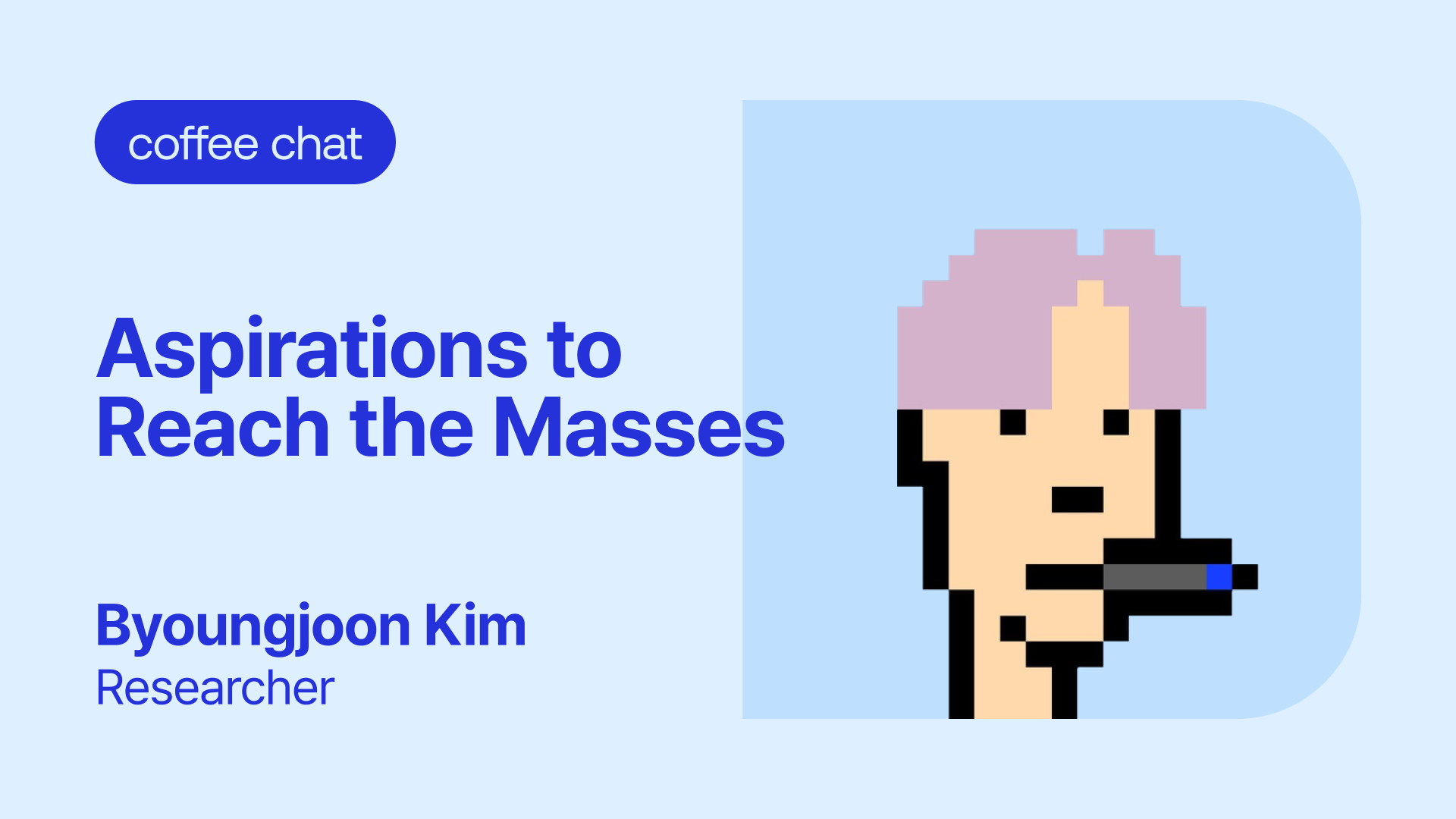
A Coffee Chat With D's Friends | Byoungjoon Kim / Research
This time, we sat down with Byoungjoon Kim (Tranks) from our Research Team to discuss ‘research in the Web3 market’.

Aspirations to reach the masses
**Disclaimer) The opinions expressed in this interview are those of the interviewer and do not represent the official statement of DeSpread.
Hello, I’m Eunji Cho at DeSpread. DeSpread is a company of “Degens” who are immersed in the Web 3 industry. Each of our team members has a unique personality, but we share the same DNA: a genuine love for Web 3. We work in a free-spirited atmosphere, but we’re all professionals in our respective fields.
In the previous session of <Coffee Chat with D’s Friends>, we interviewed Jaewon Choi, a consultant at DeSpread. This time, we sat down with Byoungjoon Kim (Tranks) from our Research Team to discuss ‘research in the Web3 market’.
Byoungjoon began his career at a Web3 education platform and is now a researcher at DeSpread, writing articles on topics like DeFi (Decentralized Finance) and the broader Web3 ecosystem. In this edition, we explore his research philosophy and routine.

Eunji: Could you briefly introduce yourself?
“I’m Byoungjoon Kim, part of the research team at DeSpread, focusing on Web3 and blockchain research. I go by the nickname ‘Tranks’ on X (formerly Twitter), inspired by the character Tranks from Dragon Ball, who I really like.”
Eunji: How did you get into Web3?
“I was first introduced to Web3 through NFTs (non-fungible tokens). My major was originally music composition, and I was working in the music industry at the time. One day, a friend mentioned to me that ‘art NFTs are an exciting new technology.’ That was back in 2021, during the NFT bull market, and that’s when I started exploring what NFTs were all about.
Initially, I looked into how music could be integrated with blockchain, but the more I studied blockchain, the more intrigued I became. Perhaps because I used to make beats while doing hip-hop, I found the narratives surrounding blockchain particularly compelling. Concepts like decentralization offer a break from traditional systems, creating fair and equitable new rules. I think I was deeply drawn to that."
Eunji: Since blockchain has many technical aspects, how did you start learning about it?
“I started by searching online, browsing X, and joining a study group at Ludium, a Web3 education platform. Through the study sessions, I learned foundational concepts like Bitcoin, distributed ledgers, and timestamps. I also experimented with setting up crypto wallets and engaging in on-chain activities.”
Eunji: What kind of work did you do before joining DeSpread?
“While participating in Ludium’s study sessions, I was invited to join DeSpread. Before that, I worked at Ludium, where I was responsible for developing Web3 education curriculums, operating training programs, and managing communities.
To elaborate, I created and refined blockchain educational content, particularly on foundational topics I had studied. I turned cutting-edge Web3 technologies into educational material, frequently adapting to the industry’s rapid pace. I also worked closely with co-founders to discuss strategies for establishing Ludium as a leading Web3 education startup.
In community management, I developed onboarding guidelines for community managers, tailoring them to Web3’s unique dynamics. Given the critical role communities play in this industry, I conducted training that highlighted key differences between platforms like X, Discord, and Telegram.”

Eunji: Why did you choose DeSpread?
“At the time, I had a strong desire to delve deeper into the Web3 space. My previous role focused on creating Web3 educational content, which didn’t allow for in-depth exploration of the industry.
DeSpread stood out to me because it seemed to attract many ‘degens’—a term often used to describe deeply engaged Web3 enthusiasts—and I saw this as a strength. The company’s ability to leverage this expertise for growth was very appealing.”
Eunji: What do you do at DeSpread?
“I conduct research on specific protocols in the Web3 market and write related articles. While my teammates, Declan and our team lead Do Dive, also cover macroeconomic topics, I primarily focus on Web3-related subjects. For instance, I contribute to the weekly Market Commentary, mainly covering Web3 market trends.”
Eunji: What are the characteristics of DeSpread’s Web3 research, and what’s unique about your approach?
“DeSpread’s research excels at presenting blockchain industry insights and market trends in a way that’s accessible to a general audience. When I write, I strive to ensure that even those with limited understanding of Web3 can follow along.”
Eunji: I understand you have experience using various DeFi platforms. What first got you into DeFi?
“I first learned about DeFi through the Ludium study group, where I studied the operational principles and concepts of popular protocols at the time, like Uniswap and MakerDAO. As I studied DeFi, I started to see its potential and the bigger vision. NFTs were my initial entry point into the blockchain space, but even after studying them, I struggled to understand what Web3 truly meant.
On the other hand, the deeper I explored DeFi, the more I became convinced that it could effectively replace traditional financial infrastructure. Today, the financial system is largely controlled by a few institutions. However, with DeFi automating this infrastructure, users could save on fees that would normally go to financial institutions or even directly share in the profits generated by DeFi.”
Eunji: You’ve done extensive research on BeraChain through your articles and on X. Could you give us a brief introduction to BeraChain?
“BeraChain is one of the most anticipated projects, even though it has yet to launch its mainnet or conduct a TGE (Token Generation Event).
BeraChain can be seen as a Layer 1 structure that incorporates the Solidly model of existing DeFi protocols. This unique approach has garnered significant attention, as it is a concept that hasn’t been implemented before. For example, it features a distinct mechanism where liquidity providers for protocols are rewarded with network tokens, and network stakers determine where these tokens will be emitted.
In short, BeraChain is designed to resolve the conflict between network security and protocol liquidity that exists in other systems. It creates a sustainable ecosystem by harmonizing the interests of network token holders, protocols, and liquidity providers.”
Eunji: I understand you joined DeSpread as a researcher and were promoted to a full-time position even before your probation period ended. That speaks to your strong research skills. Could you share your research routine?
“My daily routine, like that of many researchers, involves closely monitoring X and on-chain analysis tools to catch market trends.
When observing what KOLs (Key Opinion Leaders) on X are saying, I approach their opinions with a critical perspective. Since their views are based on their own perspectives, blindly trusting them can limit how you view the market. That said, I maintain a list of reputable KOLs and check their insights regularly.
Before writing an article, I start by outlining its structure. For instance, I first determine how the article’s flow will unfold, then create a bullet-point list of the key points I want to include. Once I begin writing, I refine the content by adding detailed information and supplementary data. Before starting this process, I usually spend 1-3 days gathering and archiving relevant materials and data.”
Eunji: Your research team has three members in total. How is the synergy within the team?
“We all have different areas of interest and perspectives, so there’s a lot we can learn from each other through discussions. Declan is excellent at objectively analyzing and organizing phenomena or situations, while our team lead excels in logical structuring. Since they’ve both helped me a lot since I joined, I always strive to learn from them.”
Eunji: In your opinion, which player, sector, or technology in the Web3 space has shown the most significant achievements this year?
“I think *Aerodrome on the Base network has performed exceptionally well. It currently has the highest TVL (Total Value Locked) on Base, and its trading volume and transaction fees rival those of DEXs (Decentralized Exchanges) on other networks. In fact, within the Base ecosystem, Aerodrome’s trading volume surpasses that of Ethereum’s leading DEX, Uniswap.
Recently, institutions like Spartan Group and Coin Ventures have also purchased $AERO tokens. This indicates their intent to wield influence within Aerodrome. If the Base ecosystem continues to grow, I believe Aerodrome could become a key player within it.”
*Aerodrome: A DEX on the Base network based on the Solidly model, which incentivizes liquidity providers to manage liquidity more efficiently.

Eunji: What is your philosophy on research, and what direction do you want your research to take moving forward?
“I believe this aligns with the strengths of DeSpread Research. In my view, articles from Web3 research companies are still read by only a small, select audience. It’s rare for the general public to actively seek out or engage with these articles, let alone see them go viral.
To guide the Web3 market toward long-term growth and inspire more people to recognize its vision, we need articles that are accessible to a broader audience and capable of persuading them. Writing such articles is both my goal and my philosophy.”
Eunji: Who do you think would benefit the most from reading your research?
“I believe it would be most helpful for people who are entering this space to invest. When people encounter Web3 and blockchain without prior knowledge, they often see it as nothing more than speculation or a bubble. However, once they dive in and explore deeply, they’ll discover the limitless potential of blockchain applications. I want to be a researcher who inspires these individuals to rethink blockchain’s utility by reading my work.”
Eunji: It seems like research is highly valued in the Web3 industry, both domestically and internationally. Why do you think that is?
“Web3 is still a relatively new field, and there aren’t many resources or datasets available to study this industry. Additionally, information is often fragmented. Because of this environment, I think there’s a significant gap between those who are building projects and those who are studying or investing in Web3. The divide is quite substantial.
That’s why we need people who understand both sides. For example, someone who can simplify technical concepts about protocols for the general public or consolidate fragmented pieces of information into something more digestible for them. As the demand for this kind of work grows, the role of researchers is becoming increasingly important.”
Eunji: Lastly, what goals do you hope to achieve at DeSpread?
“By the time the Web3 industry expands and solidifies its place, I want to be recognized as an ‘expert’ in this field. Along the way, I hope to show the public that blockchain is not just about speculation but is a technology that can be applied to various industries, including real services and finance. There are many promising sectors, like DeFi, DePIN, and DeSci. Ultimately, I want to contribute to creating an environment where Web3 becomes mainstream and is actively utilized.”

DeSpread’s Mission
DeSpread provides refined perspective for web 3 pioneers.